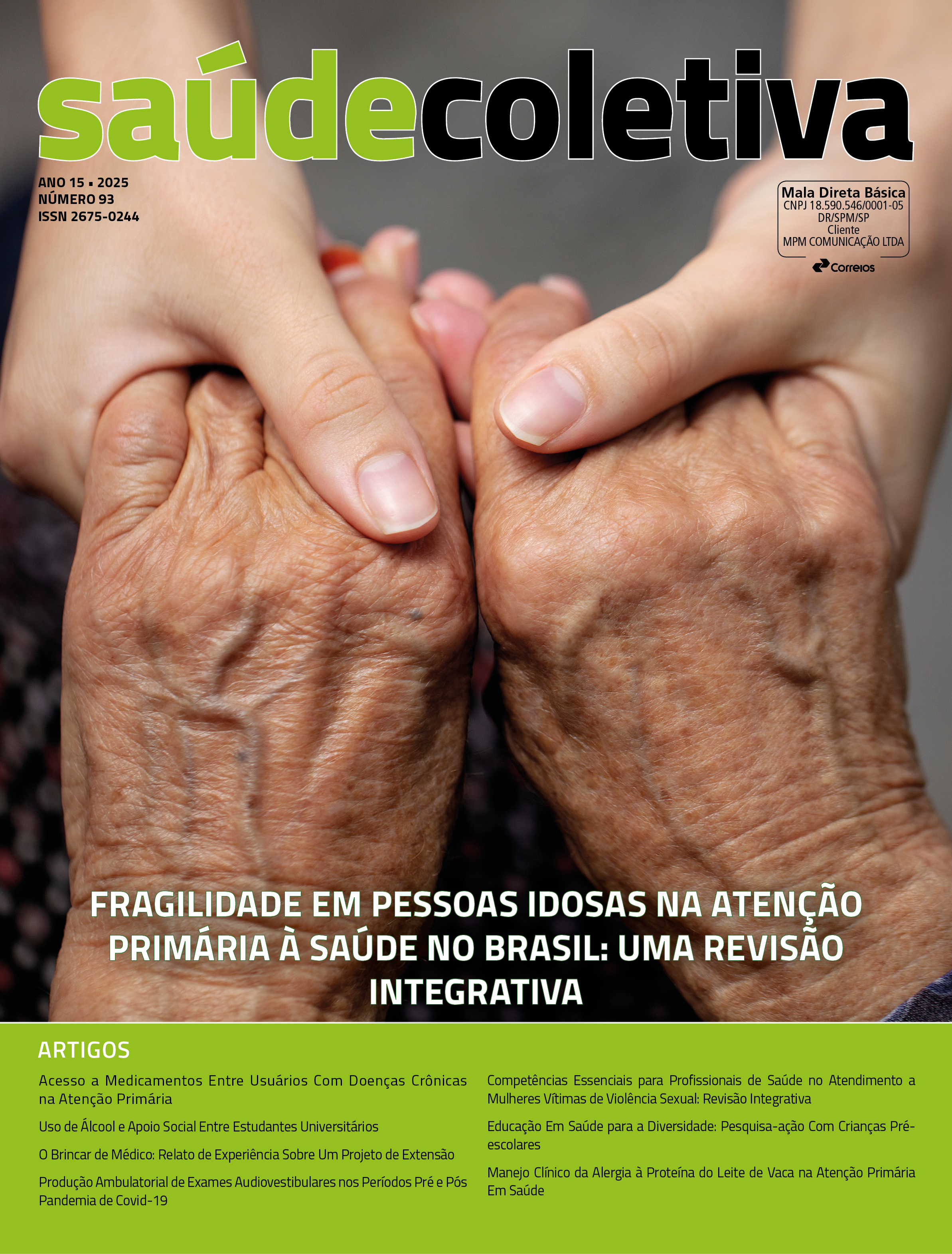Factors Associated with Digital Literacy in the Health of Elderly People: an Integrative Review
DOI:
https://doi.org/10.36489/saudecoletiva.2025v15i93p14719-14732Keywords:
Digital inclusion, Health literacy, Older adults, Gerontology, NursingAbstract
Objective: To verify in the scientific literature the factors associated with digital health literacy in older adults. Method: Integrative review conducted between November and December 2024, in the Scopus, Pubmed, Embase, Web of Science, and Lilacs databases. Results: The sample includes 7 articles published between 2018 and 2022. The factors associated with digital health literacy in older adults were: gender, household income, education level, marital status, occupation, cognitive impairment, chronic diseases, alcohol consumption, and social support. Educational level and social support networks promote digital literacy, while cognitive impairment, chronic diseases, and socioeconomic inequalities limit digital inclusion. Elderly women, people with low income, and lower education face greater difficulties in using technology. Conclusion: It is essential to promote digital inclusion strategies for older adults, regardless of their social conditions, contributing to achieving the third Sustainable Development Goal of the United Nations, which aims for health and well-being for all.
References
Oliveira WC, Hessel AMDG, Pesce L. Envelhecimento e inclusão digital: autonomia e empoderamento à luz da pedagogia crítica freireana [Internet]. Rev Prâksis (Novo Hamburgo). 2020;17(3):86–101. Available from: https://doi.org/10.25112/rpr.v3i0.2150
Diniz JL, et al. Digital inclusion and Internet use among older adults in Brazil: a cross-sectional study. Rev Bras Enferm. 2020;73:e20200241. Available from: https://doi.org/10.1590/0034-7167-2020-0241
Pereira C, Neves R. Os idosos e as TIC – competências de comunicação e qualidade de vida. Rev Kairós Gerontol. 2011;14(1):5-26. doi: 10.23925/2176-901X.2011v14i1p5-26. Disponível em: https://revistas.pucsp.br/index.php/kairos/article/view/7099. Acesso em: 12 nov. 2024.
Maciel BNO, Moreira R. Alfabetização e letramento digital para idosos. Anais Seminário Formação Docente: Intersecção entre Universidade e Escola. 2021;4(4):1-7. Disponível em: https://anaisonline.uems.br/index.php/seminarioformacaodocente/article/view/7447. Acesso em: 02 nov. 2024.
Gil H. Nativos digitais, migrantes digitais e adultos mais idosos: Pontes para a infoinclusão. Educ Psicol Interfaces. 2019;3(2):163-183. Disponível em: https://doi.org/10.37444/issn-2594-5343.v3i2.152. Acesso em: 01 nov. 2024.
Ogassavara D, Ferreira-Costa J, Silva DF da, Silva-Ferreira T da, Montiel JM. A importância da educação na inclusão e letramento digital em pessoas idosas. Perspect Diálogo: Rev Educ Soc. 2023;10(25):351-361.
Organização Pan-Americana da Saúde. O papel das tecnologias digitais no envelhecimento e na saúde. Washington, DC: OPAS; 2023. Disponível em: https://doi.org/10.37774/9789275726907.
Souza MT, Silva MD, Carvalho R. Revisão integrativa: o que é e como fazer [Internet]. Einstein (São Paulo). 2010;8(1):102-106. Disponível em: https://www.scielo.br/j/eins/a/ZQTBkVJZqcWrTT34cXLjtBx/?lang=pt#. Acesso em: 18 out. 2024.
Aromataris E, Munn Z, editores. Joanna Briggs Institute manual for evidence synthesis [Internet]. JBI; 2020. Disponível em: https://jbi-global-wiki.refined.site/space/MANUAL. Acesso em: 18 out. 2024.
Bramer WM, Milic J, Mast F. Reviewing retrieved references for inclusion in systematic reviews using EndNote. J Med Libr Assoc. 2017;105(1):84-87. doi: https://doi.org/10.5195/jmla.2017.111.
Ouzzani M, Hammady H, Fedorowicz Z, Elmagarmid A. Rayyan-a web and mobile app forsystematic reviews. Syst Rev. 2016; 5(1): 210. DOI: https://doi.org/10.1186/s13643-016-0384-4
Ursi ES, Gavão CM. Prevenção de lesões de pele no perioperatório: revisão integrativa da literatura. Rev Latino-Am Enfermagem. 2006;14(1):124-131. doi: https://doi.org/10.1590/S0104-11692006000100017.
Melnyk BM, Fineout-Overholt E. Evidence-based practice in nursing & healthcare: A guide to best practice. New York: Lippincott Williams & Wilkins; 2011
Critical Appraisal Skills Programm. Critical Appraisal Checklists [Internet]. Oxford: CASP; 2020 [acesso em 10 set. 2020]. Disponível em: https://casp-uk.net/casp-tools-checklists/. Acesso em: 22 out. 2024.
Krug R de R, Xavier AJ, D’Orsi E. Fatores associados à manutenção do uso da internet: estudo longitudinal EpiFloripa Idoso. Rev Saude Publica. 2018;52:01-12. Disponível em: https://doi.org/10.11606/S1518-8787.2018052000151. Acesso em: 16 dez. 2024.
Fox G, Connolly R. Mobile health technology adoption across generations: Narrowing the digital divide. Inf Syst J. 2018;28(6):1-25. Disponível em: https://doi.org/10.1111/isj.12179. Acesso em: 16 dez. 2024.
Lee M, et al. The difference in knowledge and attitudes of using mobile health applications between actual user and non-user among adults aged 50 and older. PLoS ONE. 2020;15(10):e0241350. Disponível em: https://doi.org/10.1371/journal.pone.0241350. Acesso em: 16 dez. 2024.
Quialheiro A, et al. Can internet use reduce the incidence of cognitive impairment? Analysis of the EpiFloripa Aging Cohort Study (2009–2019). Prev Med. 2021;154:01-07. Disponível em: https://doi.org/10.1016/j.ypmed.2021.106904. Acesso em: 16 dez. 2024.
Duplaga M. The association between Internet use and health related outcomes in older adults and the elderly: a cross sectional study. BMC Med Inform Decis Mak. 2021;21:01-12. Disponível em: https://doi.org/10.1186/s12911-021-01500-2. Acesso em: 16 dez. 2024.
Piculell E, Skär L, Sanmartin JB, Anderberg P, Bohman D. Using a mobile application for health communication to facilitate a sense of coherence: experiences of older persons with cognitive impairment. Int J Environ Res Public Health. 2021;18(21):01-16. Disponível em: https://doi.org/10.3390/ijerph182111332. Acesso em: 16 dez. 2024.
Rój J. What determines the acceptance and use of eHealth by older adults in Poland? Int J Environ Res Public Health. 2022;19(23):01-16. Disponível em: https://doi.org/10.3390/ijerph192315643. Acesso em: 17 dez. 2024.







